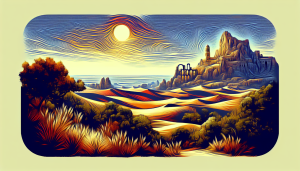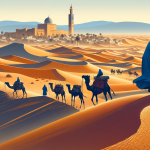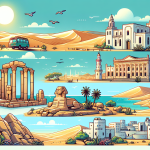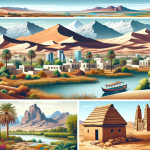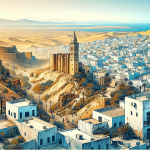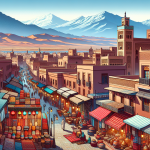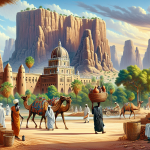Discovering Algeria: A Hidden Gem in North Africa
When people think about travel destinations in North Africa, countries like Morocco, Egypt, and Tunisia often come to mind. However, nestled between these well-trodden paths lies a hidden gem waiting to be discovered: Algeria. With its diverse landscapes, rich history, and vibrant culture, Algeria offers a unique travel experience that remains largely untapped by the crowds. From the golden sands of the Sahara Desert to the bustling streets of Algiers, the country boasts an array of attractions that cater to every type of traveler. Whether you’re an adventurer seeking the thrill of desert exploration, a history buff eager to delve into ancient Roman ruins, or a culture enthusiast looking to immerse yourself in local traditions, Algeria has something to offer. In this comprehensive guide, we’ll take you through the must-see destinations, hidden treasures, and practical tips for making the most of your Algerian adventure. So, pack your bags and get ready to explore one of North Africa’s most captivating and underrated travel destinations.
The Enchanting Capital: Algiers
Exploring the Casbah of Algiers
One of the most intriguing aspects of Algeria is its capital city, Algiers. Known as “El Bahja” or “The Joyful,” Algiers is a city that beautifully marries the old with the new. The heart of this juxtaposition is the Casbah, a UNESCO World Heritage Site that dates back to the 17th century. The Casbah is a labyrinth of narrow streets, ancient mosques, and traditional houses that offer a glimpse into Algeria’s rich history and culture. As you wander through its winding alleys, you’ll encounter stunning examples of Ottoman architecture, bustling markets, and panoramic views of the Mediterranean Sea. Be sure to visit the Ketchaoua Mosque and the Dar Hassan Pacha palace to fully appreciate the historical significance of this area.
Modern Algiers
While the Casbah offers a trip back in time, modern Algiers showcases the country’s contemporary side. The city is dotted with French colonial buildings, lush gardens, and vibrant cafes. The Martyrs’ Memorial, a towering concrete structure, stands as a symbol of Algeria’s struggle for independence. The city’s waterfront, known as the Corniche, is a popular spot for locals and tourists alike, offering stunning views of the Mediterranean and a lively atmosphere. For art lovers, the National Museum of Fine Arts and the Bardo Museum are must-visit attractions.
The Vast Expanse of the Sahara Desert
Adventuring in the Sahara
No trip to Algeria would be complete without experiencing the Sahara Desert, one of the most iconic landscapes in the world. The Algerian Sahara is a vast expanse of golden dunes, rugged mountains, and ancient rock art that stretches as far as the eye can see. The town of Tamanrasset serves as a gateway to this desert wonderland. From here, you can embark on guided tours that take you deep into the heart of the Sahara, where you’ll have the opportunity to ride camels, visit traditional Tuareg camps, and marvel at the stunning sunset over the dunes.
The Tassili n’Ajjer National Park
Another highlight of the Algerian Sahara is the Tassili n’Ajjer National Park, a UNESCO World Heritage Site known for its otherworldly rock formations and prehistoric cave paintings. The park is home to over 15,000 petroglyphs that date back to the Neolithic era, offering a fascinating glimpse into the lives of ancient civilizations. Hiking through this rugged terrain, you’ll encounter towering sandstone pillars, hidden oases, and an incredible diversity of flora and fauna. It’s a paradise for nature lovers and adventure seekers alike.
Historical Treasures: Roman Ruins and Ancient Cities
The Roman Ruins of Timgad
Algeria is home to some of the best-preserved Roman ruins in the world, and the ancient city of Timgad is a prime example. Founded by Emperor Trajan in the first century AD, Timgad is often referred to as the “Pompeii of Africa” due to its remarkably well-preserved state. The city features a grid pattern of streets, a grand arch, a theater, and numerous temples, baths, and houses. As you walk through the ruins, you can almost imagine what life was like in this bustling Roman outpost. The site also offers stunning views of the surrounding landscape, making it a must-visit for history enthusiasts.
The Ancient City of Djemila
Another remarkable site is the ancient city of Djemila, also known as Cuicul. Nestled in the mountains of northern Algeria, Djemila is a UNESCO World Heritage Site that showcases the architectural brilliance of the Roman Empire. The city features a well-preserved forum, basilica, and theater, as well as intricate mosaics that depict scenes from everyday life and mythology. The on-site museum houses a collection of artifacts that provide further insight into the history and culture of the region.
Coastal Charms: Algeria’s Mediterranean Coastline
The Beaches of Oran
Algeria’s Mediterranean coastline is dotted with charming coastal towns and pristine beaches that offer a relaxing escape from the hustle and bustle of city life. One of the most popular destinations is Oran, a vibrant port city known for its lively atmosphere and beautiful beaches. Oran’s coastline features a mix of sandy shores, rocky coves, and crystal-clear waters that are perfect for swimming, sunbathing, and water sports. The city’s waterfront promenade, known as the Corniche, is lined with cafes, restaurants, and shops, making it a great place to unwind and soak up the local culture.
The Coastal Town of Tipaza
For a more tranquil coastal experience, head to the town of Tipaza, located about 70 kilometers west of Algiers. Tipaza is famous for its Roman ruins, which are set against the backdrop of the azure Mediterranean Sea. The site includes a theater, basilica, and numerous other structures that offer a fascinating glimpse into the region’s ancient history. After exploring the ruins, you can relax on the town’s picturesque beaches or enjoy a meal at one of the seaside restaurants that serve fresh seafood and traditional Algerian dishes.
Cultural Experiences: Festivals, Cuisine, and Traditions
Algerian Festivals
Algeria boasts a rich cultural heritage that is reflected in its numerous festivals and celebrations. One of the most significant events is the Festival of Timgad, an annual music and arts festival held in the ancient city of Timgad. The festival features performances by local and international artists, as well as traditional dances, crafts, and culinary delights. Another notable event is the Sahara International Film Festival, which takes place in the desert town of Djanet. This unique festival showcases films from around the world and offers a platform for cultural exchange and dialogue.
Algerian Cuisine
No trip to Algeria would be complete without sampling its delicious cuisine. Algerian food is a flavorful blend of Mediterranean, Berber, and Arab influences, featuring a variety of dishes that are sure to tantalize your taste buds. Some must-try dishes include couscous, a traditional Berber dish made from steamed semolina grains and served with meat, vegetables, and a spicy sauce; and tagine, a slow-cooked stew made with meat, vegetables, and aromatic spices. Other popular dishes include brik, a crispy pastry filled with egg and tuna; and mechoui, a succulent roasted lamb dish.
Traditional Crafts and Souvenirs
Algeria is also known for its traditional crafts, which make for unique and meaningful souvenirs. The country is famous for its intricate carpets, which are handwoven using techniques passed down through generations. These carpets often feature geometric patterns and vibrant colors that reflect the region’s cultural heritage. Other popular crafts include pottery, jewelry, and leather goods, which can be found in markets and shops throughout the country. When shopping for souvenirs, be sure to visit local artisans and cooperatives, where you can learn more about the craftsmanship and support the local economy.
Practical Tips for Traveling in Algeria
Visa and Entry Requirements
Before embarking on your Algerian adventure, it’s important to be aware of the visa and entry requirements. Most travelers will need a visa to enter Algeria, which can be obtained from an Algerian embassy or consulate in your home country. Be sure to check the specific requirements and allow plenty of time for processing. In addition to a visa, travelers should also have a valid passport with at least six months of validity remaining.
Safety and Security
While Algeria is generally a safe destination for travelers, it’s always important to take precautions and stay informed about the current security situation. The U.S. Department of State and other government agencies provide up-to-date travel advisories and safety information. It’s also a good idea to register with your embassy and keep in touch with family and friends while traveling. When exploring the country, stick to well-known tourist areas and avoid venturing into remote or unfamiliar regions without a guide.
Transportation and Accommodation
Getting around Algeria can be an adventure in itself, with various transportation options available. Domestic flights connect major cities, while long-distance buses and trains offer a more budget-friendly way to travel. Taxis and car rentals are also available, but be prepared for varying road conditions and traffic. When it comes to accommodation, Algeria offers a range of options to suit different budgets and preferences. From luxury hotels and resorts to budget-friendly guesthouses and hostels, there’s something for everyone. For a more authentic experience, consider staying in a traditional guesthouse or riad, where you can enjoy local hospitality and charm.
Health and Wellness
It’s important to take health precautions when traveling to Algeria. Make sure you’re up to date on routine vaccinations, and consider additional vaccines recommended for the region, such as hepatitis A and typhoid. Tap water is not always safe to drink, so stick to bottled water and avoid ice in drinks. Be mindful of food hygiene, especially when eating at street stalls or local markets. Carry a basic first aid kit and any necessary medications, and be aware of the location of medical facilities in case of emergencies.
Conclusion: Embrace the Adventure
Algeria is a country that offers a wealth of experiences for the intrepid traveler. From its bustling capital and ancient ruins to its stunning desert landscapes and pristine coastline, Algeria has something to captivate every visitor. By embracing the adventure and exploring the lesser-known corners of this North African gem, you’ll discover a destination rich in history, culture, and natural beauty. So, take the road less traveled and embark on a journey to uncover the hidden treasures of Algeria.
